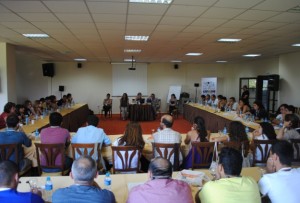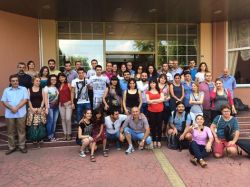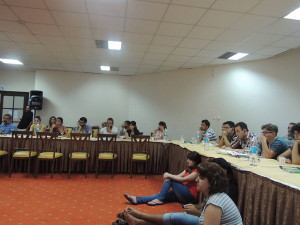Genocide Issue Discussed in Istanbul
09:56, August 25, 2014 | News, Other news A large group of school teachers from Armenia and Turkey currently attend the meeting initiated jointly by HCA Turkish Committee and HCA Vanadzor to discuss the issues related to Armenian massacres in Turkey, as well as to get to know each other and find ways to communicate to Turkish schoolchildren accurate information on the Armenian Genocide and points of contact within the GamatsGamats/Yavaş Yavaş (En. “Little by Little”) Project.
A large group of school teachers from Armenia and Turkey currently attend the meeting initiated jointly by HCA Turkish Committee and HCA Vanadzor to discuss the issues related to Armenian massacres in Turkey, as well as to get to know each other and find ways to communicate to Turkish schoolchildren accurate information on the Armenian Genocide and points of contact within the GamatsGamats/Yavaş Yavaş (En. “Little by Little”) Project.
At the meeting, Turkey is represented by school teachers from the cities, towns and villages of the country who mostly had no idea at all, rather than just a vague idea about the genocide of 1915. Those who knew history, learned about the Armenian Genocide only after Hrant Dink’s murder that became an incentive for them to seek information and reveal details.
 This 6-day Program covers lectures on the Armenian Genocide by prominent Turkish and Armenian figures renowned both in Turkey and globally, namely Murat Belge, Ümit Kurt, Zakaria Mildanoghlu, Edward Tandzikyan and others, along with discussions.
This 6-day Program covers lectures on the Armenian Genocide by prominent Turkish and Armenian figures renowned both in Turkey and globally, namely Murat Belge, Ümit Kurt, Zakaria Mildanoghlu, Edward Tandzikyan and others, along with discussions.
All the speakers agreed that the denial of the Armenian Genocide in the context of human rights and democracy in Turkey appears to be the major obstacle for building bridges of friendship between the two nations. This obstacle can be removed in two main dimensions: by conveying the historical truth to Turkish citizens and shaping the public opinion, and by influencing on the brutal and denial policy pursued by the Turkish authorities.
 It should be noted that the lectures and opinions of their compatriots (as well as Armenian speakers) came as a shock to many Turkish teachers. Meeting their Armenian colleagues tête-à-tête, communicating with them and learning their opinions created an emotional atmosphere. Particularly, the lecture on Armenian Traces in Turkey by Zakaria Mildanoghlu caused excitement among the Turkish participants that had a chain effect. Thus, Sezer Demir, a young Turkish teacher at a secondary school in Bursa could not help holding back his excitement at the discussions above. “I am not sure whether my words will have anything to do with the specific topics of the current lectures, but I would like to speak out. We are separated by a horrible history and the closed border resulting from such history. But before, we and Armenians used to share a home, didn’t we? This is our common home, and now it “hosts” horrible pictures on its walls and a corpse. How can we settle in such a house? How can we clean it and bring light to it? How can we shoulder the heavy burden passed on to us from our ancestors?” the young man was bubbled with excitement and left the meeting hall. Later he told us that he had heard about the Armenian massacre before the meeting, since despite the one-sided information in the Turkish government sources and similar records in history books, people still whisper about it.
It should be noted that the lectures and opinions of their compatriots (as well as Armenian speakers) came as a shock to many Turkish teachers. Meeting their Armenian colleagues tête-à-tête, communicating with them and learning their opinions created an emotional atmosphere. Particularly, the lecture on Armenian Traces in Turkey by Zakaria Mildanoghlu caused excitement among the Turkish participants that had a chain effect. Thus, Sezer Demir, a young Turkish teacher at a secondary school in Bursa could not help holding back his excitement at the discussions above. “I am not sure whether my words will have anything to do with the specific topics of the current lectures, but I would like to speak out. We are separated by a horrible history and the closed border resulting from such history. But before, we and Armenians used to share a home, didn’t we? This is our common home, and now it “hosts” horrible pictures on its walls and a corpse. How can we settle in such a house? How can we clean it and bring light to it? How can we shoulder the heavy burden passed on to us from our ancestors?” the young man was bubbled with excitement and left the meeting hall. Later he told us that he had heard about the Armenian massacre before the meeting, since despite the one-sided information in the Turkish government sources and similar records in history books, people still whisper about it.
Sezer admitted taking a strong interest in the Armenian Issue and seeking historical and documentary data on his own after Hrant Dink’s murder. Nevertheless, this was his first direct contact with Armenians in such a format, and on the one hand, he found this experience to be a very hard one, and on the other, he of course considered it of essential importance for both finding extra information and understanding the issue.
In response to our question on whether he would be able to apply in his work the knowledge and experience obtained at this summer school, Sezer said, “I will not be able to do so in my teaching activities, since I teach Turkish, but I will certainly discuss the Genocide with the people I know. I hope that on the threshold of the 100th anniversary of the Genocide, this topic will spark active discussions in Turkey and my students will take interest in it. And then, I will be able to share with them my information and my own opinion.”
The Turk teachers attending the above meeting for regulation of the Armenian-Turkish relations (by the way, the term ‘Turk teachers’ includes but is not limited to Turkish citizens and extends to representatives of Kurds, Laz, Arabs, Armenians and other minorities, albeit the majority of ethnic Turk attendants) felt uneasy and overwhelmed with emotions sought our pardon, and their excitement coursed through us since human communication makes it clear that human relations are broken off mostly by the barriers put up under the pressure of the state propaganda.
“Now I don’t know what to do or what to think. How should I bear this heavy burden? Since childhood, we have always heard that Armenians are bad and it is them who massacred us and hate us, and we grew up shouldering this heavy burden. I feel very deeply about this issue, I’m ashamed and I wish I could shout loudly my apologies. But the worst thing is that I have to go back to my village, with a community negative or at best indifferent attitude to Armenians due to the state propaganda.
How should I enter the school and tell my students the truth? …Apart from the psychological aspect, I will face another challenge; at school we strictly follow the state-approved curriculum,” expressed his concern Ismail Kirmizi, a Sunni Muslim raised in a conservative family in a remote Turkish village.
However, regardless of the huge psychological and legal challenges facing them, our Turkish colleagues were unanimous about the importance to such meetings and were happy about the slow ice-breaking and the tendencies of reconciliation and perhaps even friendship with Armenians.
Gayane ARUSTAMYAN
Istanbul
Aravot Daily
August 16, 2014
